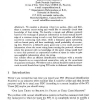1169 search results - page 27 / 234 » Two Ways to Common Knowledge |
EKAW
2000
Springer
15 years 5 months ago
2000
Springer
Knowledge refinement tools rely on a representative set of training examples to identify and repair faults in a knowledge based system (KBS). In real environments it is often diffi...
136
Voted
UAI
2000
15 years 3 months ago
2000
Algorithms for learning the conditional probabilities of Bayesian networks with hidden variables typically operate within a high-dimensional search space and yield only locally op...
124
click to vote
EUROCRYPT
1995
Springer
15 years 5 months ago
1995
Springer
We coiisider a situation where two parties, Alice and Bob, share a common secret string arid would like to mutually check their knowledge of that string. We describe a simple and e...
CORR
2004
Springer
15 years 1 months ago
2004
Springer
Understanding the structure of knowledge communities, and particularly the organization of "epistemic communities", or groups of agents sharing common knowledge concerns...
HICSS
2005
IEEE
15 years 7 months ago
2005
IEEE
This paper is concerned with the question of how activity mediated by shared representations–notations that are manipulated by more than one person during a collaborative taskâ€...

